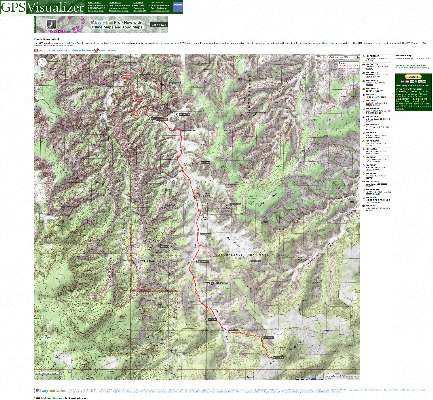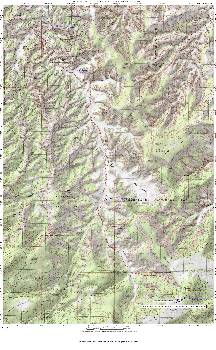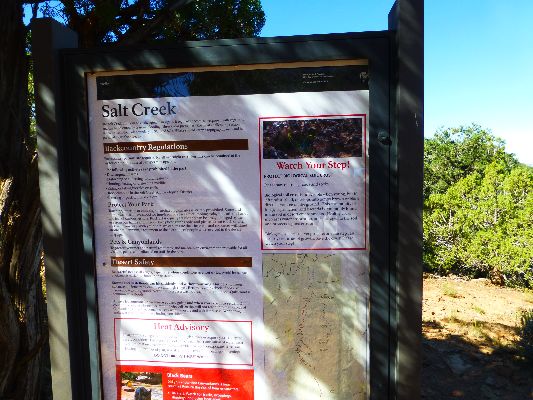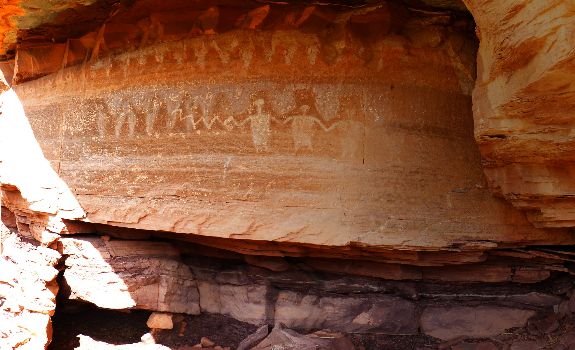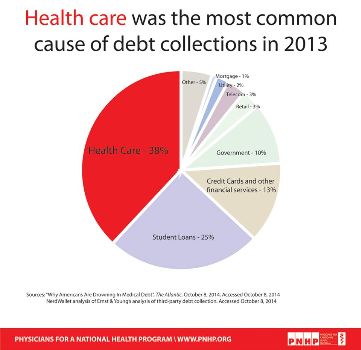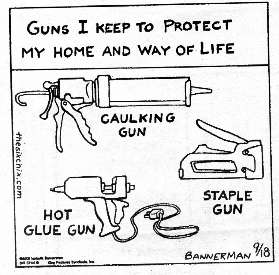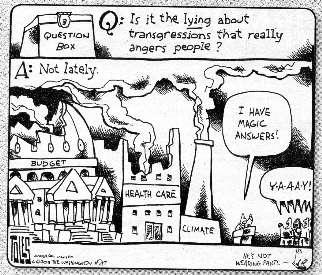Misadventure in Upper Salt Creek and your PLB
Canyonlands National Park, Utah

|
| |||||
|
| |||||
|
| |||||

| ||||
for a full-resolution map, click here. Caution - do not use this map or gps track for navigating the route.

| ||||
| ||||
| ||||
| ||||
Summary: Summary: This report may serve as an example of
what happens when things go wrong. What was the error? Hiking solo? I had notified the NPS of my plans
and had a valid backcountry permit which specified where I would be on what night. I had left a detailed
plan with Kathleen. I had excellent USGS maps and good background information. No, I did not get lost,
not ever. Yes, I fell off a rock and (I later learned) broke my ankle on both sides. No, I did not carry
a PLB (Personal Locator Beacon) and, again, I was hiking solo.
Co-adventurers: 0 (solo trip)
camera: Panasonic DMC-ZS19
Prelim: Yesterday, I left Bob Bordasch's and Donna Karr's Hobbit
House hospitality and drove from San Cristobal, NM to the Cathedral Butte TH, the last 18 miles on OK dirt.
Thanks Bob and Donna! It was terrific and necessary to have a free day to wash things and dry the tent, etc.
following the Sensuous Sin in the
Precious Pecos Wilderness Adventure (see report - click here).
Along the way, I cross the deep shadow notch of the Rio Grande, then pass the Eaarthship colony outside
Taos. Some innovative designs. Sure, even Eaarthships are impacted by the dramatic change we have forced on
Eaarth (Eaarth; this spelling indicates that our present planet no longer resembles Earth) via global climate
change and overpopulation. Sure, people are starting to publically state that climate change promises a much
greater absolute risk than terrorism, yet have you noticed that population growth (i.e., explosion) is rarely
mentioned as a huge aspect of the problem? Terrorism, inflicted by corporations or religionists or climate change,
is spawn
of population growth of course. And so it goes.
"Reality has a well-known liberal bias." - Stephen Colbert
You will not see waypoints for any of the archeological features (e.g.,
ruins, pictos, petros) in the report maps. You will see references to camps and arches.
The first hiking day of this excursion, I hiked from the Cathedral Butte TH
to Salt Creek 4 (SC4) camp, a long day in the monsoon jungle. The next day I went exploring and fell and broke
my ankle. Argh. I spent the next day in SC4, then hiked slowly out of Salt Creek over the following three
days. I actually stayed on my permit. The slow pace out was designed to allow exploration of ruins and pictos,
and ended up working well for just getting out.
Prelim Photos - Needles 2014












Day 1: Brush Beating : Cathedral Butte TH (Trail Head; about 7,000')
to SC4 (Salt Creek Camp #4; NPS, National Park Service, designation). 14.0 miles; ERM = 20; camp @ 5450'.
The tricolor All American Man appears to grin down at me from his
protective alcove as I lounge on slickrock and eat lunch #2 beneath a juniper. He can smile because
he's above the brush beating inflicted by the vegetation-choked "trail." It's often difficult to see
the trail, wading through sage, grass, rabbit brush, willows, tamarisk, and lots of grabby sharp and
pokey things. Perhaps one-half of the "trail" today is obscured and brush covered. Argh! Yes, it feels
like more than half. Much is waist- head-high or taller. I'm a bit tired, yet there are another 4 or
so miles to slog to SC4 camp. I see ruins, arches, pictos - all delightful and making the beating worthwhile.
To verify this, I soon see the Four Faces smile above wall remnants.
I get off-track and thrash around in close-rank sage for awhile.
The trail fades repeatedly as I approach SC4 and I nearly miss the camp, which is marked by an 18"
post sporting a camp triangle. It's a camp for hot weather - having a large Cottonwood and high fairly
narrow canyon walls to protect one from too much sun at least part of the day. A consequence of this is
that the views are narrow, lacking the far-ranging quality of some camps. It's about 1500' to good water,
which I set about gathering.
Now, after 8 p.m., I sit on my bear can and watch the stars through my
narrow vantage points. Yes, bear canisters are now required in some areas of The Needles because the bears
come off the Abajo Mountains and Elk Ridge in search of berries, cactus apples, etc. I attempt to choke down
some food but my tired body rebels. I did enjoy a quick bucket bath and tried to rinse the yellow pollen,
green leaf/stalk smears, and purple spots made by some sort of soft-bodied beetle (at first, I thought these
were spots of my blood from the brush beating), and a pound of salt from my shirt and pants. Not a "trail"
for shorts today. This area has experienced a very generous monsoon rain season, and the brush has vigorously
responded. Humm, I muse, perhaps I'll eat some of this dinner for breakfast, as I slide the pot into my bear can.
I'm guessing the temperatures today were in the 80Fs. The cool air courses
down the Salt Creek drainage and I notice the tail of the Big Dipper glowing through the trees and obstacles
to the generous sky.
| ||||
Day 1 Photos - Needles 2014
 |
 |
 |
 |
 |
 |
 |
 |
 |
 |
 |
 |
 |
 |
 |
 |
 |
 |
 |
 |
 |
Day 2: Picto Pause and West Fork Catastrophe : 4 miles exploring and limping.
I turn to check my path and I'm shocked by the eerie, skeletal red
anthropomorphic shaman/ghost figure staring out of hollow eyes. Yikes. Wondrous. I'm headed to explore
the West Fork and detour to inspect the ruins and pictos on the nose of the main canyon. It's narrow going
at times on the Cedar Mesa Sandstone (SS), where these apparent storage granaries and picto billboards are
crafted into a thin ledge. One structure is hidden in a cave and I can see the fingerprints of ancient
craftswomen in the centuries-old mortar. Fascinating. Clouds are building, so I find a way onto the bench
of West Fork and sit through a storm under an overhang. I shoot some videos of ruins as seen through the rain.
Then, catastrophe. With mud on my boots, I step on a slanted rock and -- boom,
down with a sprained or broken left ankle. Of course, all thoughts of exploration evaporate with the searing pain.
Taking off the boot, I note that my foot is already swelling. Easing the foot back in the boot and securing it,
I jerk and limp through the next rainstorm and the wet jungle to camp. If I had an emergency beacon (PLB;
Personal Locator Beacon), would I now trigger it? Tempting. My injury is not life-threatening, yet, still.
Anyway, I don't have a PLB.
| ||||
Day2 Photos - Needles 2014
 |
 |
 |
 |
 |
 |
 |
 |
 |
 |
 |
 |
 |
 |
 |
| ||||
Day 3: RICE : 0 miles. Still at SC4.
Something about RICE (Rest, Ice, Compression, Elevation) comes
to mind. I lie in the tent and prop the left ankle up on my bear can, next to or on top of a
cool water bottle. No compression. Then, I count the ibuprofen - certainly more than
recommended - yet this is something special. I watch the clouds, woodpeckers, chipping
chipmunk, inquisitive scrub jay, ground squirrel, bees, whatever I can see from the open tent doors.
I'm finally cooked out of the tent in the afternoon by direct sun, the time before this being
a feature of SC4. Will I make it out over the next three days? To SC3, then SC2, then the TH?
Because I've seen no one today, it's a plan. And, it's the way I designed the permit, although
not for self-extraction, for exploring all the tempting rock coves and alcoves as I work my way
back up canyon. Humm. Black and blue and bloated like a Summer sausage, my foot skin is taught
as a drum. And, it hurts too.
Day 3 Photos - Needles 2014
 |
 |
 |
Day 4: Hobble to SC3 : 3.6 miles; ERM = 5; camp @ 5700'.
Caught in the waist-high jungle again, my left foot twists, and there
flows the pain. Arghh! It's sort-of OK on level, open space, when pressure can be straight down. Yet,
twisting any direction off-plumb is agonizing, so I go slowly. Perhaps reaching 1 MPH on the good
stretches of trail, I hobble along. Thankfully, it's a short day and about all I can handle.
After getting water from up the trail toward the Four Faces, I'm
sitting under a scrub oak at SC3 with my foot in (for now) a cool bucket of water. Ahh.
I was planning a ranging exploration from SC3, yet today I'm
exploring the meager, yet delightful, shade while gazing at the Neapolitan Cedar Mesa SS littering
the view. My leg is warming the water in the bucket - like one of those coil heaters once used in
coffee cups. Soon, it will be bath water. My overall speed today was a bit less than 1 MPH, and good
enough to get here. The special features of SC3 become more apparent as sunset approaches.
Delightful scrub oak cast a deepening and extending shadow. Billions and billions of stars
pop out, Orion blares on the Southern horizon.
Day 4 Photos - Needles 2014
 |
 |
 |
 |
 |
 |
Day 5: Wobble to SC2 : 6 miles; ERM = 8; camp @ 5900'.
After wobbling a bit over a mile, the All American Man again
seems to smile at me. Is he smiling with me or at me? It's slow going where the trail sneaks
through a gap between tall rock pillars near the AA Man. There are lots of angled steps and slickrock
work, fun on a regular day. Today is not a regular day and I carefully ease through the notch. After
communing with the AA Man, I trundle on in the full sun, finding that I can almost walk on level trail
using short steps. Good. I meet Jim and crew, who are headed for SC4, and I tell them about the jungle
warfare, and most importantly, the water near this camp. After a discussion of ankle taping, we continue
our separate ways.
Wobbling past ruins yet unexplored, I find my plan (i.e., campsite
reservations) good yet my condition folly. Eyebrow, Elephant Trunk, Ring, then Kirk Arch roll into view.
Near Kirk Cabin, I find the camp, leave most equipment, and mosey the 0.3 miles to the outflow from the
East Fork Spring, where I gather and treat water, enjoy lunch, and soak my foot in the surprisingly cool
water. I see a Belted Kingfisher perching on a willow snag, watching the large pool below the cascade of
spring water. I meet two USGS folks, who are hiking to Big Pocket to monitor a vegetation tract. They
suggest I put a note on the camp post if I need help, and they will stop in on their way out of the canyon
later today.
Lee Kirk built the local cabin and corrals in the late 1800's, yet did
not stay much longer than to have the large Kirk Arch named after him. Even so, the cabin was used as
a line shack by ranchers until Canyonlands National Park was designated, in the 1960s. It's good foreground
for a photo today.
Now, it's mid-afternoon and I'm enjoying the music of tumbling water as
it cascades down rock steps, and the enchanting background of intricate layers of Cedar Mesa SS. Thoughts
about medical care keep creeping into the nirvana of The Needles. I recall, with great disgust, how all
the repulsicans and many wimpy democrats maintained the death panel control of insurance carriers rather
than support a decent universal healthcare system. Just getting the profit and insurance company control
out of health care would drop health care costs by what - 20%, 30%, more? Corporate welfare should never
come to health care. Medicare for all.
The sun drives me back to the camp area and I await shade in camp a short
distance away, under an overhang. Looking up from my bed of slickrock, I see a Bighorn Sheep picto in red
and some tiny white handprints. Satisfying, I enjoy a mini-exploration today after all.
| ||||
| ||||
"Life is like riding a bicycle. To keep your balance you must keep moving." - Albert Einstein
| ||||
Day 5 Photos - Needles 2014
 |
 |
 |
 |
 |
 |
 |
 |
 |
Day 6: Stumbling Cathedral : SC2 to TH and home. 4.6 miles; ERM = 7.5.
Orion beams brightly in the Southern sky, foretelling Fall, and
soon. Then Winter, argh. I have this sinking, frustrated feeling that it might be Winter before
I can smoothly enjoy the wildness.
It's cool enough this morning that the tent fly has running condensation.
I'm up early so I can stumble up and out of Salt Creek to the TH near Cathedral Butte and drive home.
Lacing the boots carefully and tightly, my lopsided ambulation is going more smoothly today as I weave
and push through the monsoon-generated jungle. Up a thousand feet and more, up through the Cedar Mesa
SS and a few layers above, I knock out of the Needles.
Day 6 Photos - Needles 2014
 |
 |
 |
 |
 |
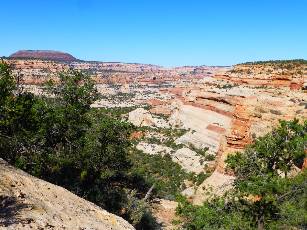 |
Epilog : A broken ankle, in two places. Perhaps thanks to my high-top Lowa boots, the bones somehow remained stable and so far I have not had surgery. Nevertheless, the recovery process has been slow and little fun and I've had to cancel two Grand Canyon backcountry trips (one a volunteer service project I have been organizing for many months) and lots of local hiking and biking. Argh. Cabin fever has arrived already.
| ||||
.
An Analysis of PLBs (Personal Locator Beacons):
Yes, cell phones sometimes work in the backcountry. It's
amazing how many cell phone calls are received by the SAR (Search And Rescue) people/agencies.
Of course, cell phones don't always work, and in some of the most delightful places never work,
and often don't transmit gps (global positioning system; your position on a map) coordinates with
a call. Cell phones communicate via towers while PLBs use satellites. If it's truly an emergency,
a cell phone is insufficient and may create a false sense of security. A heavy in weight,
subscription-heavy satellite phone is a good alternative for some and allows two-way communication,
making it the "standard" for river trips and other large group activities in the backcountry. If you
are going in a small group or solo, you probably won't carry a satellite phone. So, if phones are a
poor choice for the independent outdoors person, what's the alternative?
Ideally, one wants a device that absolutely works during an emergency,
transmits gps coordinates with the emergency signal (so SAR people can find you), is light in weight,
has a good battery life, and does not require subscription fees. By absolutely works - one wants a PLB
with lots of power so it can send the signal through trees, out of narrow canyons, etc.; and uses a
proficient satellite system (not cell phone towers). A true PLB (such as a 5-watt ResQLink) - sends a
signal directly to SAR while a satellite messenger (e.g. Spot, broadcasts at 0.4 watts; DeLorme InReach,
1.6 watts) signals a private company and at lower power.
Cost is another factor, with the 3-year cost of a ResQLink currently
estimated at about $350, a Spot about $550, and an InReach about $1000 - see article.
Light in weight suggests a unit weighing less than 5 ounces so it isn't
perceived as a bother to take it along. A good battery life means that you can just go with your PLB for
5 years or so without worrying about battery life. And, then there are subscription fees, which make
satellite phones and satellite messenger devices (e.g., Spot) less attractive. If you haven't paid your
subscription fees, your device will not work (as opposed to cell phones, with which you can still call
emergency if other services do not work).
My analysis of the reviews of PLBs and satellite messengers reduces down
to: carry a PLB (not a messenger) like the ACR ResQLink because one does not have to worry about changing
the batteries for five years or paying a subscription. And when you're really in trouble, it's the device
that has proven to work best (has 5 watts of power, while the Spot has a meager 0.4 watts). If you like the
messenger aspect, I suggest you carry a capable device, such as the DeLorme InReach Satellite Messenger,
yet it will cost and weigh more than a PLB. Use your PLB responsibly, that is only in life-threatening
situations, the outdoor annals are filled with annoyance from SAR and others when outdoor people use an
emergency signal in casual situations (e.g., such as the infamous story about Grand Canyon hikers who
triggered their Spot because they thought the water was salty).
A final note: Be sure to register your PLB on the NOAA online
beacon database. This way, SAR knows which unit (that is, registered to you and having contact
and background info about you) triggered the emergency signal.
An excellent review of PLBs can be found here: (click here). .
I came home to see that the Arizona Daily Sun has published one of my hiking articles, this one about the Sycamore Rim Trail.
| |||
.
.
An
excellent review of PLBs can be found here: (click here).
An
overview of 406 PLBs (such as the ACR) vs. the Spot can be found here: (click here).
Chomsky: Are We Approaching the End of Human History (article, 2.3 mb)
Maze 2013: Marauding the A-Mazing Marvelous Maze, 9-day backpack, 2013
Triple Flushing The Magnificent Maze: Exploring The South Fork area of THE Maze, 2010
A-Mazing Maze, a Desert Solitaire: Exploring The Fins Area of Canyonlands NP, 2009
Snowfest attempt in THE Maze, 2009
Disraeli Gears: Bicycling The White Rim of Canyonlands N. P., 1999
Jointly To The Needles: Dayhiking in The Needles District of Canyonlands N.P., 1998
| ||||
| ||||
| ||||
| ||||
| ||||
| ||||
| ||||
More - More truth than joke - part 1
 |
 |
 |






